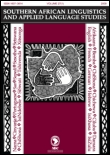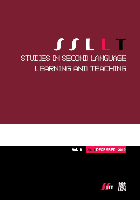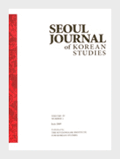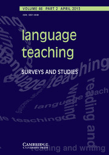
Journal of the International Network for Korean Language and Culture
Scope & Guideline
Bridging Cultures Through Language Research
Introduction
Aims and Scopes
- Korean Language Education Research:
Focuses on innovative teaching methodologies, curriculum development, and educational strategies for teaching Korean as a foreign language, targeting diverse learner populations. - Linguistic Analysis and Pragmatics:
Explores the nuances of Korean linguistics, including grammar, syntax, semantics, and pragmatics, providing insights into language use and learner behavior. - Cultural Studies and Intercultural Communication:
Examines Korean cultural elements and their integration into language education, emphasizing the importance of cultural context in language learning and communication. - Technology in Language Learning:
Investigates the role of technology, such as online learning platforms and AI tools, in enhancing Korean language education and learner engagement. - Translation Studies:
Analyzes translation practices, challenges, and educational approaches, particularly focusing on the Korean language in comparison with other languages.
Trending and Emerging
- Multimodal and Dynamic Learning Approaches:
The use of eye-tracking and other multimodal research methods is gaining traction, indicating a trend towards understanding how learners engage with the Korean language through diverse media. - Focus on Pragmatic Competence:
There is an increasing emphasis on evaluating and enhancing pragmatic competence among Korean learners, reflecting a growing recognition of the importance of context in language use. - Intercultural Communication Strategies:
Research on intercultural education and communication strategies is on the rise, particularly in understanding how cultural differences impact language learning and teaching. - Education for Specific Purposes (ESP):
A growing focus on tailoring Korean language education for specific professional fields, such as business or translation, is emerging, highlighting the need for context-specific language skills. - Digital Literacy and Online Learning:
The integration of digital tools and online learning methodologies is trending, especially in light of recent global shifts towards remote education.
Declining or Waning
- Traditional Language Teaching Methods:
There is a noticeable decrease in the exploration of conventional teaching methods, as the journal shifts towards more innovative and technology-driven approaches to language education. - Descriptive Linguistics without Application:
Research that solely focuses on descriptive aspects of the Korean language without practical application in teaching or learning contexts appears to be waning, as the focus shifts towards applied linguistics. - General Cultural Studies:
While cultural studies remain important, the journal is moving away from broad cultural analyses in favor of specific applications of culture in language education and intercultural communication. - Static Curriculum Evaluations:
There is a reduced emphasis on static evaluations of language curricula, as more dynamic and responsive approaches to curriculum development are being prioritized.
Similar Journals

Fontes Linguae Vasconum
Unlocking the Richness of Language StudiesFontes Linguae Vasconum, published by GOV NAVARRA, DEPT CULT SPORT & YOUTH DIR GENERAL CULT-INST PRIN VIANA, stands as a pivotal academic resource in the field of Linguistics and Language studies. Established as an Open Access journal since 2007, it ensures wide dissemination of research findings and promotes collaborative dialogue among scholars, researchers, and students. With a growing impact factor reflected in its Q2 category ranking in Linguistics and Language for the year 2023 and an impressive standing in Scopus with a rank of #443 in Arts and Humanities, the journal serves as a significant platform for advancing knowledge derived from the rich linguistic heritage of the Basque language and beyond. The journal is dedicated to publishing high-quality research articles, reviews, and discussion pieces that explore diverse aspects of language, fostering connections between contemporary linguistic theories and their practical implications. Based in Pamplona, Navarra, Spain, Fontes Linguae Vasconum continues to evolve, providing researchers and academics with essential insights and a valuable reference in the vibrant field of linguistics.

Al-Arabiyya-Journal of the American Association of Teachers of Arabic
Advancing Pedagogy and Scholarship in Arabic Language EducationAl-Arabiyya: Journal of the American Association of Teachers of Arabic, published by Georgetown University Press, serves as a significant platform for research and scholarship in the fields of Arabic language education, linguistics, and literature. With its ISSN 0889-8731 and E-ISSN 2375-4036, this journal presents a robust blend of original articles, reflections, and pedagogical research aimed at both seasoned educators and emerging scholars. While the journal is not an open-access publication, it maintains a commendable impact in its categories, achieving Q4 in Education and Q2 in Literature and Literary Theory as per the latest rankings. Notably, it has been recognized within Scopus for its contributions to the arts and humanities, with rankings that reflect a vibrant academic discourse surrounding the Arabic language. Al-Arabiyya aims to promote and enhance the teaching and learning of Arabic while fostering an understanding of its literary and cultural richness, making it an invaluable resource for anyone interested in Arabic studies.

English Teaching and Learning
Pioneering Strategies for Effective English Language InstructionEnglish Teaching and Learning is a distinguished academic journal published by SPRINGER SINGAPORE PTE LTD, focusing on the dynamic fields of education and linguistics. With an ISSN of 1023-7267 and an E-ISSN of 2522-8560, this journal serves as a vital platform for researchers, educators, and practitioners interested in advancing the understanding of English language instruction and learning methodologies. Recognized for its high standards, it has achieved a notable Q2 ranking in Education and a prestigious Q1 ranking in Linguistics and Language in 2023, underscoring its impact within these essential scholarly fields. The journal, which spans a converged publication period from 2015 to 2024, endeavors to disseminate innovative research, theoretical insights, and practical applications, making it an invaluable resource for anyone committed to enhancing English education globally. Although it does not operate under an open-access model, its contributions are pivotal in shaping contemporary discourse in English teaching and learning.

Southern African Linguistics and Applied Language Studies
Championing Research in Linguistics and Language PolicySouthern African Linguistics and Applied Language Studies is a prestigious journal dedicated to the exploration and analysis of linguistics and applied language studies within the Southern African context. Published by Taylor & Francis Ltd, this esteemed journal has established itself as a significant platform for scholars and practitioners since its inception in 2003. With an impressive Q2 ranking in the Linguistics and Language category and a current Scopus rank of #430 out of 1167, it occupies a vital position in the academic landscape, appealing to a diverse readership keen on linguistic research, language policy, and applied linguistics. While the journal is not currently open access, it provides comprehensive insights and scholarly articles that foster understanding and innovation in linguistic practices and language education. As of 2024, the journal continues to deepen its impact through rigorous peer-review and a commitment to advancing knowledge, making it a key resource for researchers, educators, and students seeking to navigate the complexities of language within the Southern African region and beyond.

CogniTextes
Decoding Language Through Cognitive Lenses.CogniTextes (ISSN: 1958-5322) is an esteemed open access journal published by the Association Française de Linguistique Cognitive, dedicated to the exploration of cognitive linguistics and its intersection with textual interpretation. Since its inception in 2007, CogniTextes has been a vital platform for disseminating cutting-edge research that delves into the cognitive processes underlying language use, enhancing our understanding of linguistics in a cognitive context. This journal not only fosters scholarly communication among researchers and professionals but also serves as a valuable resource for students keen on advancing their knowledge in cognitive linguistics. With its headquarters located at the University of Lille 3 in France, CogniTextes encourages contributions from a diverse spectrum of disciplines, thereby enriching the field of linguistics and cognitive studies. The journal's commitment to open access ensures that its findings are readily available to a global audience, thus facilitating knowledge sharing and academic discourse.

Folia Linguistica et Litteraria
Exploring the Interplay of Language and LiteratureFolia Linguistica et Litteraria, published by the University of Montenegro's Institute of Language and Literature, is an esteemed academic journal that provides a vital platform for the exploration and discourse in the fields of Linguistics and Literary Theory. With an ISSN of 1800-8542, this journal serves as a significant resource for researchers, educators, and students alike, fostering an understanding of language, literature, and their interrelationship. Having established its presence in the scholarly community, Folia Linguistica et Litteraria has been ranked in the 2023 quartiles, achieving Q3 in Linguistics and Language, and Q2 in Literature and Literary Theory, indicating its growing influence and relevance. Its Scopus rankings further underscore the journal’s commitment to high-quality research, reflecting its standing within the arts and social sciences. While the journal operates without open access, its rigorous peer-review process ensures that only the most impactful studies are published. As it converges its focus from 2019 to 2024, this journal invites contributions that challenge conventional boundaries, encouraging interdisciplinary dialogue and innovative research in the rich fields of linguistics and literary studies.

Studies in Second Language Learning and Teaching
Advancing the frontiers of language education.Studies in Second Language Learning and Teaching is a premier open-access journal dedicated to advancing research and scholarship in the fields of education, linguistics, and language acquisition. Published by ADAM MICKIEWICZ UNIVERSITY, KALISZ, this journal has consistently achieved high acclaim, reflected in its impressive Q1 rankings in both Education and Linguistics and Language categories for 2023. With a robust focus on innovative methods, effective pedagogical strategies, and interdisciplinary approaches, Studies in Second Language Learning and Teaching aims to facilitate dialogue among researchers, educators, and practitioners, fostering a deeper understanding of language learning and teaching in diverse contexts. Since its transition to open access in 2011, the journal has expanded its reach, providing valuable resources and research findings to a global audience. With an exceptional Scopus ranking placing it in the top percentiles across multiple categories, this journal stands as a crucial platform for the dissemination of ground-breaking research in second language education.

Porta Linguarum
Exploring the intersection of language and learning.Porta Linguarum, published by UNIV GRANADA in Spain, is a pioneering journal dedicated to the fields of linguistics and language studies, with a dual focus on the educational implications and applications within these disciplines. Launched in 2008 and continuing its impactful contributions into 2024, the journal is recognized for its rigorous peer-reviewed articles that address contemporary language issues, pedagogical approaches, and linguistic research, evidenced by its notable rankings in the 2023 Scopus metrics. Porta Linguarum holds a distinguished Q1 classification in Linguistics and Language, alongside a respectable Q3 placement in Education, marking it as a valuable resource for academics and practitioners alike. With an impressive ranking of 231 out of 1088 in the Arts and Humanities category and a strong 78th percentile ranking for Language and Linguistics, this journal facilitates the exchange of innovative ideas and promotes scholarly discourse. Although currently not adopting an open access model, it remains an essential platform for advancing knowledge in linguistics and education.

Seoul Journal of Korean Studies
Unveiling the Rich Tapestry of Korea's CultureThe Seoul Journal of Korean Studies, published by the KYUJANGGAK Institute of Korean Studies, serves as a vital platform for scholarly discourse in the multifaceted fields encompassing Korean studies, cultural studies, linguistics, archaeology, sociology, and political science. Since its inception in 2013 and with convergence extending to 2024, this journal plays a significant role in promoting academic research dedicated to understanding Korean heritage and society. While it currently holds a Q4 ranking in various categories, including Arts and Humanities and Cultural Studies, it remains a critical resource for students, researchers, and professionals seeking valuable insights into Korean culture. The journal fosters a diverse range of scholarly articles and discussions, aiming to enrich the comprehension of Korea's socio-cultural dynamics in a global context. Researchers and academics are encouraged to engage with this publication to contribute to, and benefit from, the growing body of Korean studies literature.

Language Teaching
Fostering dialogue on the latest trends in language education.Language Teaching, published by Cambridge University Press, is a premier peer-reviewed journal that has been at the forefront of the linguistics and language education field since its inception in 1969. With an impressive impact factor positioning it in the top tier (Q1) of its category, this journal is ranked 22nd among 1,088 in the Arts and Humanities field and maintains an outstanding 98th percentile ranking. Focusing on innovative research and methodologies in language teaching and learning, Language Teaching provides a vital platform for discussing the latest developments in pedagogy, applied linguistics, and curriculum design. Although it does not offer open access options, it reaches a broad audience of researchers, educators, and practitioners dedicated to enhancing language instruction across various contexts. The journal continues to evolve, with plans to cover emerging trends and challenges in language education until 2024, making it an essential resource for anyone invested in the teaching of languages.